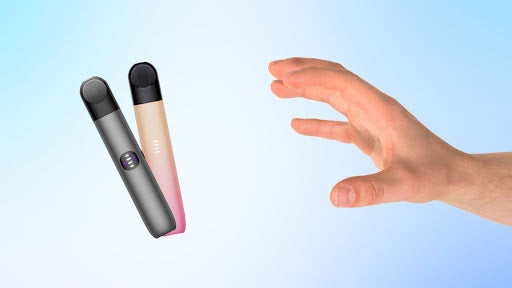Are You Worried Your Dentist Knows You Vape?
A dentist can tell a lot about their patients' lifestyle choices with just one exam. Just as they can tell that someone's been consuming sugary foods if they see a mouth full of cavities, it's usually easy for a dentist to tell if someone is vaping nicotine regularly.
Nicotine can be bad for your teeth. In some cases, a regular habit can lead to a negative effect, like tooth damage or tooth loss. Naturally, people may be hesitant to tell their dentist about this lifestyle choice.
If you think that your dentist will identify that you've been using a vaping device, you might be right—the dentist will likely be able to tell from a few oral giveaways.
Here, we answer questions about how vaping impacts your teeth, if your dentist can tell, and whether you should openly tell your dentist about your vaping habit.
Does Vaping Affect Oral Health?
Many people switch to vaping because they believe it's a safer alternative than smoking cigarettes. However, e-cigarettes or vaping devices can still lead to oral health issues, including your teeth and gums, saliva, tongue, and even the roof of your mouth.
Staining Teeth
While there's no smoking tobacco involved, vaping can involve nicotine, which can stain teeth. When mixed with the saliva in your mouth, nicotine creates brown or yellow stains on the teeth, which is bad for dental health.
The longer you consume nicotine, whether vaping or smoking, the more prominent your tooth staining will be.
Gum Disease
Studies show the negative impacts that vaping can have on gums. Nicotine may act as a blood constrictor, limiting blood flow to the gum tissue.
The effect can lead to gum disease. Nicotine may also lead to an increased risk of developing bone loss and periodontal pockets.
Dry Mouth
Nicotine reduces saliva flow, and when you pair that with the ingredient Propylene Glycol, which absorbs moisture in the mouth, you can experience dry mouth.
Lack of saliva can lead to halitosis—bad breath smell. It can also cause trouble speaking or swallowing, make your mouth feel sticky, and cause sore throats.
Tooth Decay and Cavities
Just like sugary foods cause cavities, smoking vapes can cause the same adverse effects due to propylene glycol, which damages tooth enamel and makes your mouth more prone to cavities.
On top of the cavities, additional ingredients, such as vegetable glycerin and flavourings, can make bacteria stick to teeth, causing even more tooth decay damage.
Tooth Damage
Nicotine is a stimulant, which can lead to tooth-grinding and clenching, known as Bruxism.
Over time, Bruxism can lead to damaged teeth. It can also contribute to headaches and jaw pain and increases the risk of bone loss.
Sores and Burns
Excess or heavy vaping may also impact the delicate cells lining the roof of your mouth. It can lead to inflammation and uncomfortable sores, burns, and lesions.
Can Vaping Cause Cancer Like Smoking Cigarettes?
Tobacco smoke is carcinogenic and linked to disease outcomes just about anywhere in the human body, from the mouth and throat to the stomach, liver, and colon. However, there is no supporting evidence that vaping causes cancer.
Can Dentists Tell If You Vape?
Just as a dentist can tell if someone smokes cigarettes, the likelihood is yes; your dental team can tell if you vape or smoke.
A person who pretends otherwise and acts smarter to avoid detection will still have giveaways. Dentists can spot these judging by your oral health when you come in for a dentist appointment.
Signs You Vape
Some of the most obvious giveaways that might let a dentist know you vape include:
- Dry mouth
- Negative effects on teeth and gums like receding gums
- Teeth with one or more stain
- Bad smell to the breath
The longer you've been vaping, the harder it will be to hide the negative effects on your gums and teeth. This is the same with cigarette smokers or those who use chewing tobacco.
Should I Tell My Dentist I Vape?
Wondering if you should tell your dentist that you vape? If you're worried they'll tell you to quit smoking or quit vaping, don't let this fear cause you to keep things from your medical providers.
If you care about your oral health by attending regular dental checkups, you should also be honest with your dentist to get the best care.
A Dentist's Response
A good dentist won't make you feel guilty or force you to stop smoking. They will talk to you openly, possibly about the risk associated with the choice.
Some may recommend you give the vape up, but this is only because of their training and experience.
A dentist has seen first-hand how vaping can be bad for your teeth, including gum damage, gum disease, and other side effects a smoker or vaper may face.
However, they can't make you do anything, and they might be able to answer your questions and offer some extra tips to counteract some of the risk and damage of vaping.
Dental Tips for Vapers
Some tips they might offer include:
- Drink plenty of water to stay hydrated, especially after vaping
- Take good care of your teeth, making sure you are regularly flossing and brushing to avoid cavities
- Minimize your vape use
Will My Dentist Tell My Parents?
If you're a minor, you may worry your dentist will tell your parents. While there are limits to doctor-patient confidentiality for those underage, your dentist likely won't tell them if you ask them not to—unless there are serious problems with your oral health or underage.
If that's the case, your dentist may feel your parents have a right to know so they can intervene.
Conclusion
Can your dentist tell if you're smoking or vaping? Maybe—it depends on how long you've vaped, how frequently you vape, and what (if any) oral health damage has occurred.
If you care about your well-being, be honest with your dentists about using nicotine e-cigarettes at your next dentist appointment. A vape can cause oral and overall health problems, but being open from the start can prevent unnecessary damage.
Also in Vape Knowledge

Quick Fixes for a Burnt Vape Taste

Are Vapes Allowed in Checked Luggage?














